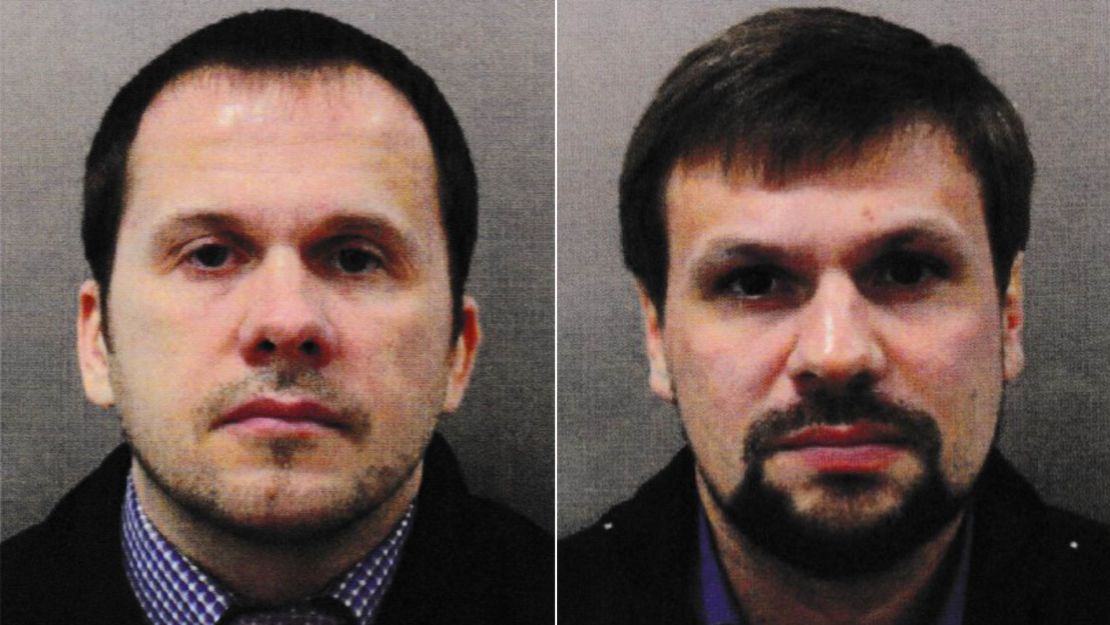The investigative website that claimed to have uncovered the real identity of one of two Russian agents involved in the Novichok poisonings in the UK earlier this year has now named the second one.
UK website Bellingcat claimed Monday the agent traveling under the name Alexander Petrov is a military doctor named Alexander Mishkin, a 39-year-old working for Russian military intelligence, the GRU.
According to the investigative site, “multiple sources familiar with Mishkin, both in St. Petersburg and in his native Loyga” identified Petrov as Mishkin. CNN has not independently verified Bellingcat’s reporting.
The UK’s Metropolitan Police Service said it would not comment on speculation regarding the true identities of the two men accused of poisoning Russian spy Sergei Skripal and his daughter with the nerve agent Novichok in the southern English city of Salisbury in March.
In a statement, the Met reiterated it believed the two suspects “were using aliases and a European Arrest Warrant and Interpol Red Notices remain in circulation for the two men.”
Bellingcat last month named the other suspect in the Skripal poisonings as GRU Colonel Anatoliy Chepiga, also known as Ruslan Boshirov. Its first article naming him went into great detail about how it had come up with the name, including speaking to “multiple sources familiar with the person and/or the investigation.”
Russian Foreign Ministry spokeswoman Maria Zakharova called the first report “bogus.” CNN has contacted her and Russian President Vladimir Putin’s spokesman Dmitry Peskov for comment on the new article.

Secret identity
Bellingcat said Mishkin was born in 1979 in the village of Loyga, and graduated from one of Russia’s elite Military Medical Academies, where he was trained as a military doctor for the Russian naval armed forces.
“During his medical studies, Mishkin was recruited by the GRU, and by 2010 had relocated to Moscow, where he received his undercover identity – including a second national ID and travel passport – under the alias Alexander Petrov,” the website said.
It added that Mishkin “traveled extensively under his new identity,” including to the Ukraine and the self-declared Transnistrian Republic in Moldova, which is supported by Moscow.
While it said his current military rank is unknown, the Bellingcat report said it could be “posited that as the time of the Skripals’ poisoning incident he was either a Lt. Colonel or a full Colonel.”
Bob Seely, a Conservative member of the foreign affairs committee of the UK’s House of Commons, expressed dismay at the suggestion of a doctor’s involvement.
“It’s appalling that a medical doctor appears to have been part of a team of GRU operatives that attempted to deliver a lethal poison to their target – and accidentally killed another person by mistake,” he told CNN. “Whilst this operation has been a botched embarrassment for the Kremlin from beginning to end, it’s worth remembering that we may not know about the GRU’s successful operations and therefore shouldn’t judge the GRU alone by their failures.”
Seely told CNN this latest report shows the UK needs to step up its “long-term plan to understand and exposed Russian subversion.”
Putin dismisses controversy
The alleged poisonings of the Skripals by Russian agents caused significant fallout between Moscow and London, with many allies of the UK also weighing in against the Kremlin.
At an energy forum in Moscow last week, Russian President Vladimir Putin dismissed the furor, calling Skripal a “traitor” and a “scumbag” and suggesting the incident was being “artificially blown up” by the media.
“I see that some of your colleagues are pushing the theory that Mr. Skripal is almost a human-rights activist,” Putin said in response to a journalist’s question about the case. “He’s just a spy. A traitor to the Motherland. There’s such a thing as a traitor to the Motherland. He’s one of them. He’s just a scumbag, that’s all.”
Putin said that the Salisbury affair “is being artificially … blown up” by the media, but added: “It’ll pass, eventually … The sooner it’s over, the better.”





